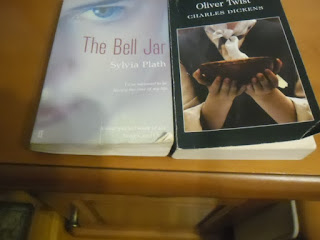Sunday 9 September 2018
Plath to Dickens (My Current Reading)
The picture above pretty much summarises what I've been reading recently.
Finished reading Sylvia Plath's 'The Bell Jar' over a month ago. Had been intending to read it for many years, and finally got round to doing so.
Of course, 'The Bell Jar' isn't for the fainthearted, and I found it a frenetic read, especially the parts dealing with Esther Greenwood's rapid descent into depression and her encounters with electroshock treatment. Stylistically, it's impossible not to notice the death imagery/metaphors that seem to greet the reader page after page. My favourite character in the novel is one of the background ones, one of Esther's mother's neighbours, Dodo Conway, a highly energetic, Catholic mother with 6-7 children. Many years ago, I read a biography of Sylvia Plath, and, if my memory serves me right, at some point, she'd become interested in Catholicism and had even thought about becoming Catholic. In 'The Bell Jar', I can't help but sense that Dodo Conway is portrayed in something of a (semi-) positive light when everything else is frantically dark around.
After finishing 'The Bell Jar', I immediately started reading 'Oliver Twist' with me having intended to read this great Dickens novel for many years too. Before 'Oliver Twist', the only other Dickens I'd read was 'Hard Times' while studying Literature at university during the late 1980s/early 1990s and 'A Christmas Carol' while living in a bedsit attic on Walmersley Road in Bury, Lancashire in the mid-1990s.
At first, I found 'Oliver Twist' a bit slow-going, especially with all the workhouse scenes in the opening chapters. Still, these opening chapters are interesting, and Dickens' satirical indictment of the workhouse system; food rationing to inmates; the cynical roles of the beadle and workouse matron etc. reminds me a lot of Blake's 'Songs of Innocence and of Experience' (especially the 'Holy Thursday' and 'The Chimney Sweeper' poems). As I expected, having seen the classical film of 'Oliver Twist', the novel hots up when Oliver arrives in London with the Artful Dodger. The portrayal of Fagin as "the Jew" is fascinating, think that this aspect of the novel will have the modern-day, politically-'correct' mob up in arms, of course. Really like the rough diamond character of Nancy (she has not been corrupted by her difficult experience), while the character of Bill Sykes, let's just say he's a genuine ogre. I'm currently only halfway through 'Oliver Twist', but I'm very much looking forward to reading the second half. What I especially like about the novel is that it allows me to visualise what mid-19th century London must've looked like.
Subscribe to:
Post Comments (Atom)

No comments:
Post a Comment